A Mississippi Tribe Is Growing Its Own Organic Movement
With programs for schools, elders, and diabetics across 10 counties, Choctaw Fresh Produce is making sure its tribal members have access to fresh, healthy food.
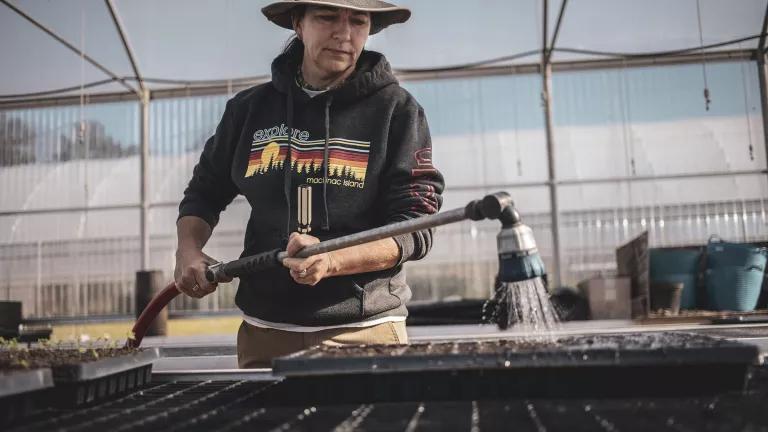
Daphne Snow, farm manager of Choctaw Fresh Produce, watering a freshly planted tray of turnip seeds
A decade ago, Daphne Snow had to drive three hours from her home in Philadelphia, Mississippi, to buy organic vegetables. Since then, some organic produce has crept into the state via national supermarket chains, but quality, locally grown options are still hard to find. Even so, Snow gets what she needs because these days, she helps grow the vegetables herself.
Snow is the farm manager for Choctaw Fresh Produce, an organic farming initiative started by the Mississippi Band of Choctaw Indians (MBCI) to increase access to affordable, healthy produce. The farm serves 11,000 members, who live in eight separate communities spread across 10 counties. Snow oversees five acres of high tunnel greenhouses on four different certified organic farms on the reservation and, along with three of Choctaw’s five other employees, grows staples like corn, beans, and squash.
“Instead of fast food and junk food, we’re providing people with greens and fresh vegetables, things they need,” says Snow, who has worked for the tribe for 20 years and is Choctaw Fresh’s only non-tribal employee. “And what we’re growing is probably even better than what they’re growing in their backyards. Most people I know aren’t going to pick the bugs off or pull the bad plants instead of spraying. It’s very hard to find stuff like we produce.”
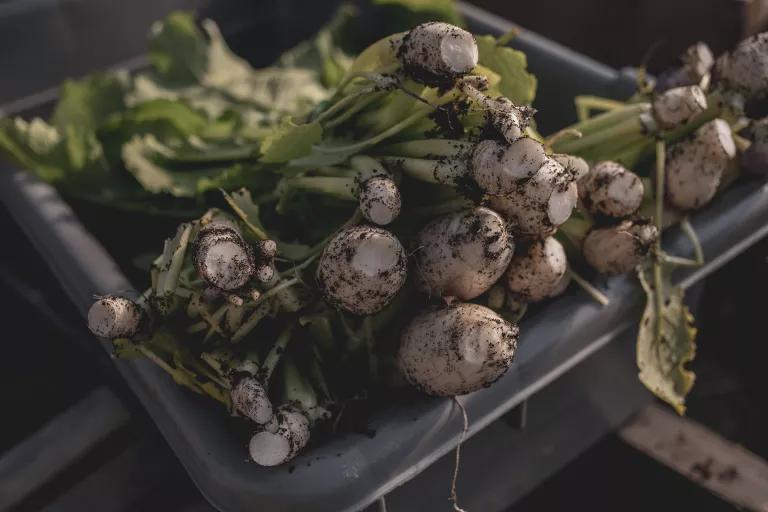
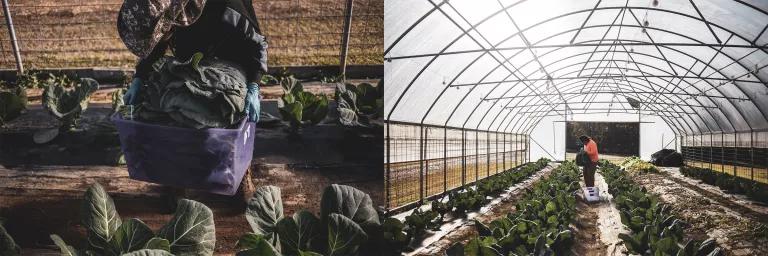
Growing food on the reservation for the reservation
Choctaw Fresh Produce’s mission has evolved over the past decade. Its founders started the grant-funded project in 2012 hoping to create jobs and spark economic growth for the tribe, which had exceptionally high unemployment and poverty rates. But after trying to sell their produce off-reservation—oftentimes hours away where there was more demand for organic foods—they soon realized that farming wasn’t much of a moneymaking venture. Over the years, Choctaw Fresh has also struggled with a high turnover rate for growers. With travel between the four farms spread out across 100 miles, sweltering greenhouse temperatures, and strict, labor-intensive organic protocols, Snow says finding people passionate enough to stick around has been difficult.
“You start out farming with these great ideas of all the things you can do, and it doesn’t always work out,” Snow says. “We have learned from trial and error since 2012—what works, what doesn’t work, and how to get more produce into tribal hands.”
Nowadays, Choctaw Fresh Produce seeks to keep 75 percent of its yield on the reservation, with produce going either directly to individual tribal members or to the casinos, restaurants, and staff cafeteria at the tribe-owned Pearl River Resort. (The resort employs more than 2,000 people, most of whom are MBCI members.) In addition to stocking local schools, a mobile market, and programs for tribal elders and those with diabetes, Choctaw Fresh also runs a TSA (tribal-supported agriculture) program analogous to CSA (community-supported agriculture) initiatives elsewhere.
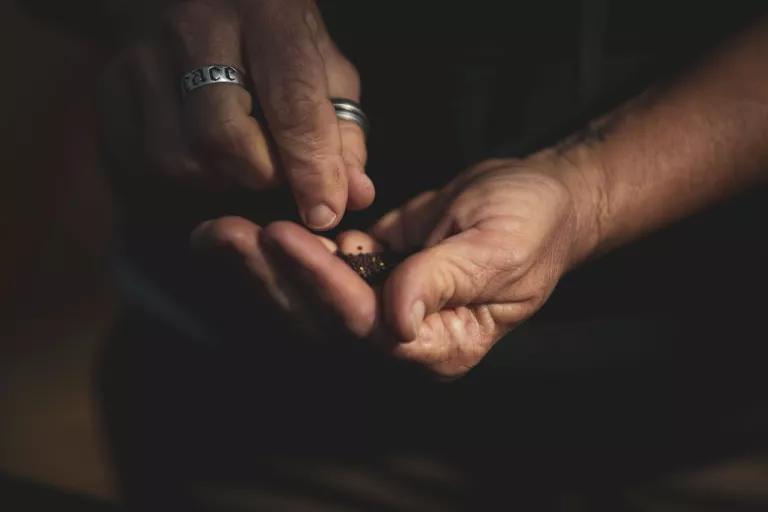
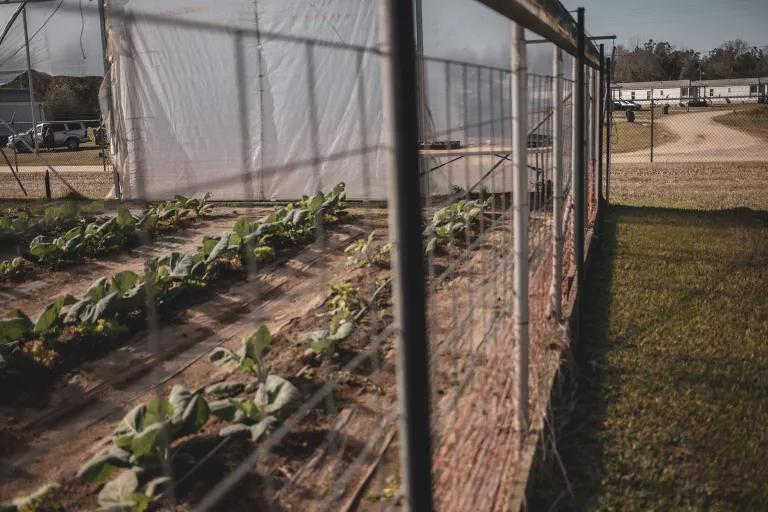
The shift toward ensuring greater access to the locally grown produce reflects the tribe’s desire to address food insecurity and improve community health. Mississippi has the country’s highest obesity rate, at nearly 40 percent, and almost 2,000 MBCI members, roughly 16 percent, have type 2 diabetes.
Apart from their own health complications, obesity and diabetes also increase the risk of severe illness from COVID-19. At least 120 members have died from the virus since March 2020. Choctaw Fresh had already been distributing its produce to the tribe’s diabetes program when the pandemic hit, but it soon ramped up its efforts, sending out more than 4,000 pounds of vegetables to families in need during the pandemic’s first wave. This is an example of how local farming efforts can critically boost community resistance during times of emergency.
From the ground up
The extra effort of farming organically has also paid off with environmental benefits. “So much of this land has been farmed to death, and we want to bring it back,” says Snow, referring to land that had previously been farmed conventionally. Choctaw Fresh’s first focus was to regenerate the soil and begin the challenging three-year transition period required for certified organic farms. “Choctaw Fresh Produce is giving something you can’t buy. Healthy soil has to be made, and that’s what we’re doing right here on tribal land. It’s soil that will last for generations to come.”
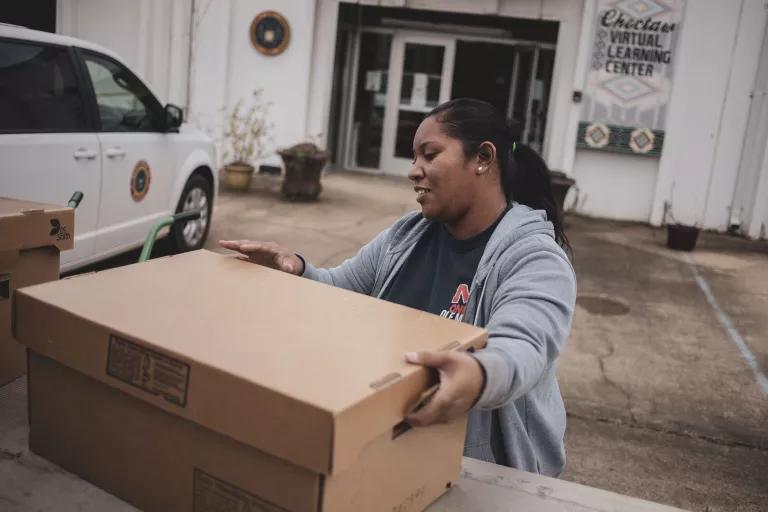
Historically, MBCI was a farming tribe, and Tomika Bell, Choctaw Fresh’s local food coordinator, sees the initiative as a way to reclaim that identity. This is why she makes sure the farms grow traditional foods like blueberries, collard greens, squash, and turnips, and why she encourages elders to share memories of when they relied on gardens to feed their families and communities. “I try to bring back the old wave of how our Mississippi Choctaws used to live before all these fast foods,” says Bell, a MBCI member who speaks fluent Choctaw. “We take so much pride in making sure our elders are taken care of. They are the storytellers. They are the ones who still remember how it feels to grow everything from the ground up.”
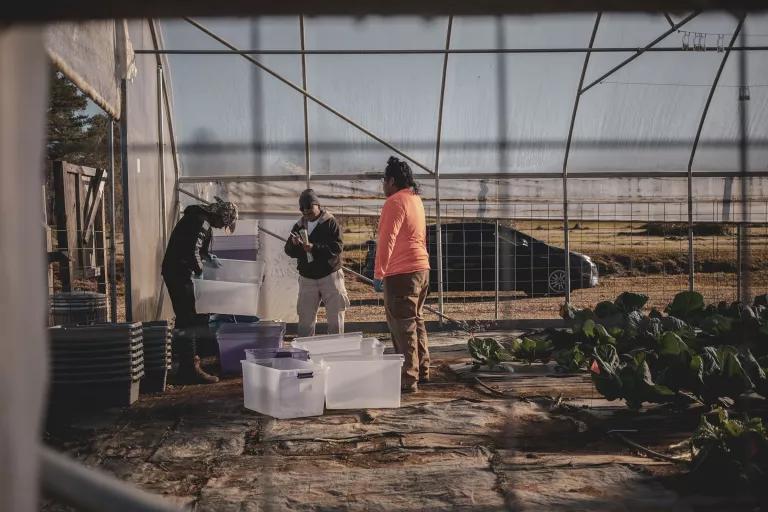
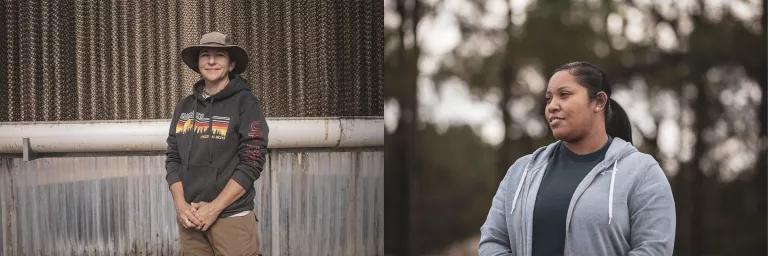
But Choctaw Fresh Produce also has its sights set on the future. In 2018, a three-year, $100,000 USDA farm-to-school grant helped kick-start an effort to provide MBCI students weekly access to organic produce at their schools. The grant also kept cafeteria workers on the payroll through the summer months so they could help process and store the season’s produce for the coming school year. Bell hopes additional funding could help expand the program even further.
Choctaw Fresh also hosts workshops on the farms for school-age kids. Snow says some of the children didn’t know where their vegetables came from, and even thought that tomatoes were grown in the back of Walmart.
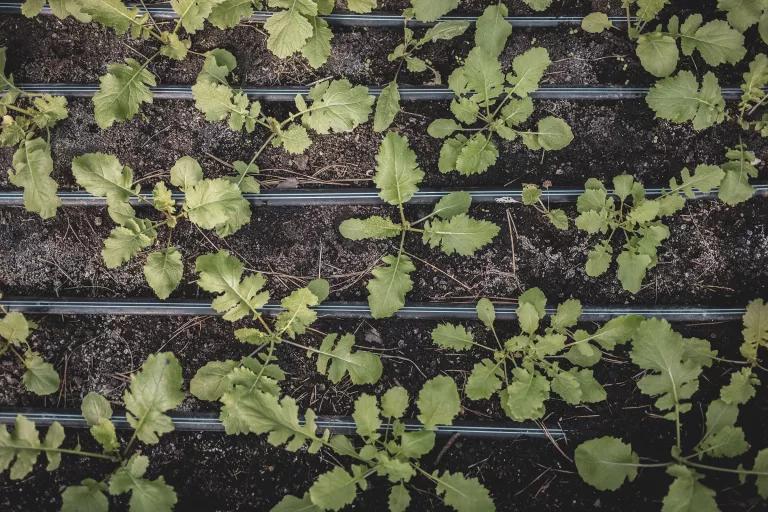
“We’re trying to make sure these kids are starting off their eating habits healthier,” says Bell. “If they don’t know what they’re eating, and we don’t teach them, that’s where their resistance comes in.”
More broadly and across generations, Choctaw Fresh is helping to demystify organic produce and doing away with misconceptions that it is elitist and expensive. And the farmers hope their work and influence on local diets and health may one day extend beyond the reservation, becoming a catalyst for the creation of more certified organic farms in Mississippi and across the South.
This NRDC.org story is available for online republication by news media outlets or nonprofits under these conditions: The writer(s) must be credited with a byline; you must note prominently that the story was originally published by NRDC.org and link to the original; the story cannot be edited (beyond simple things such as grammar); you can’t resell the story in any form or grant republishing rights to other outlets; you can’t republish our material wholesale or automatically—you need to select stories individually; you can’t republish the photos or graphics on our site without specific permission; you should drop us a note to let us know when you’ve used one of our stories.

For Thousands of Years, Indigenous Tribes Have Been Planting for the Future
In Planning for Climate Change, Native Americans Draw on the Past
Under “Food Apartheid,” Urban Farms Are More Important Than Ever
For Thousands of Years, Indigenous Tribes Have Been Planting for the Future
In Planning for Climate Change, Native Americans Draw on the Past
Under “Food Apartheid,” Urban Farms Are More Important Than Ever
For Thousands of Years, Indigenous Tribes Have Been Planting for the Future
In Planning for Climate Change, Native Americans Draw on the Past
Under “Food Apartheid,” Urban Farms Are More Important Than Ever
For Thousands of Years, Indigenous Tribes Have Been Planting for the Future
In Planning for Climate Change, Native Americans Draw on the Past